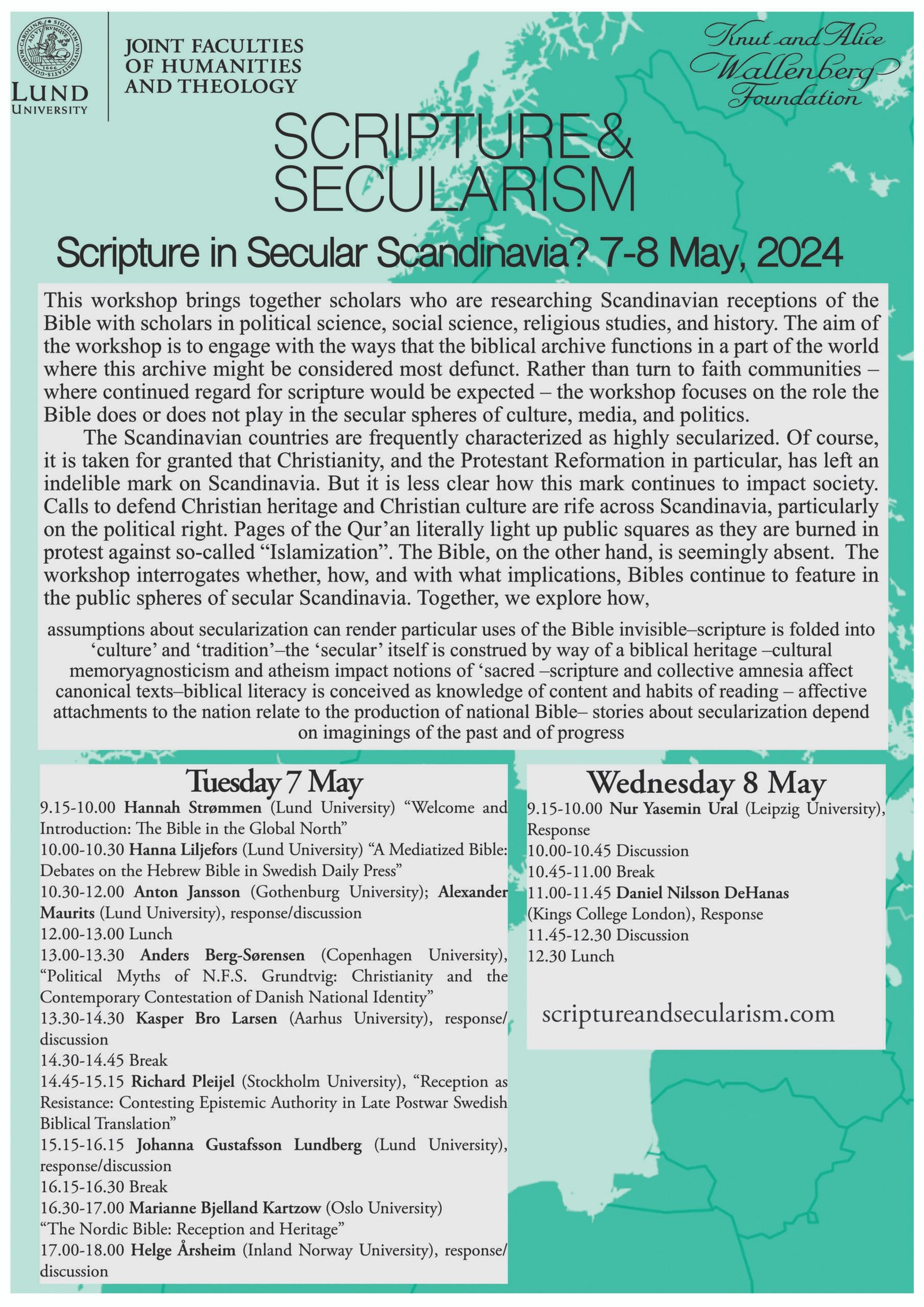
Scripture in Secular Scandinavia?
This workshop brings together scholars who are researching Scandinavian receptions of the Bible with scholars in political science, social science, religious studies, and history. The aim of the workshop is to engage with the ways that the biblical archive functions in a part of the world where this archive might be considered most defunct. Rather than turn to faith communities – where continued regard for scripture would be expected – the workshop focuses on the role the Bible does or does not play in the secular spheres of culture, media, and politics.
The Scandinavian countries are frequently characterized as highly secularized. Of course, it is taken for granted that Christianity, and the Protestant Reformation in particular, has left an indelible mark on Scandinavia. But it is less clear how this mark continues to impact society. Calls to defend Christian heritage and Christian culture are rife across Scandinavia, particularly on the political right. Pages of the Qur’an literally light up public squares as they are burned in protest against so-called “Islamization”. The Bible, on the other hand, is seemingly absent.
The workshop interrogates whether, how, and with what implications, Bibles continue to feature in the public spheres of secular Scandinavia. Together, we explore how,
- assumptions about secularization can render particular uses of the Bible invisible
- agnosticism and atheism impact notions of ‘sacred scripture’
- the ‘secular’ itself is construed by way of a biblical heritage
- biblical literacy is conceived as knowledge of content and habits of reading
- affective attachments to the nation relate to the production of national Bibles
- cultural memory and collective amnesia affect canonical texts
- scripture is folded into ‘culture’ and ‘tradition’
- stories about secularization depend on imaginings of the past and of progress
The aim is for contributions to be developed further as a result of the workshop and be published.
Schedule
Tuesday 7 May
Room: B417
9.15-10.00 Hannah Strømmen (Lund University)
“Welcome and Introduction: The Bible in the Global North”
10.00-10.30 Hanna Liljefors (Lund University)
“A Mediatized Bible: Debates on the Hebrew Bible in Swedish Daily Press”
10.30-12.00 Anton Jansson (Gothenburg University), response + discussion
Alexander Maurits (Lund University), response + discussion
12.00-13.00 Lunch
Chair: Frida Mannerfelt
13.00-13.30 Anders Berg-Sørensen (Copenhagen University)
“Political Myths of N.F.S. Grundtvig: Christianity and the Contemporary Contestation of Danish National Identity”
13.30-14.30 Kasper Bro Larsen (Aarhus University), response + discussion
14.30-14.45 Break
Chair: Samuel Auler
14.45-15.15 Richard Pleijel (Stockholm University)
‘“Reception as Resistance: Contesting Epistemic Authority in Late Postwar Swedish Biblical Translation”
15.15-16.15 Johanna Gustafsson Lundberg (Lund University), response + discussion
16.15-16.30 Break
Chair: Hanna Liljefors
16.30-17.00 Marianne Bjelland Kartzow (Oslo University)
“The Nordic Bible: Reception and Heritage”
17.00-18.00 Helge Årsheim (Inland Norway University), response + discussion
Wednesday 8 May
Room: C337
Chair: Hannah Strømmen
9.15-10.00 Nur Yasemin Ural (Leipzig University), Response
10.00-10.45 Discussion
10.45-11.00 Break
11.00-11.45 Daniel Nilsson DeHanas (Kings College London), Response
11.45-12.30 Discussion